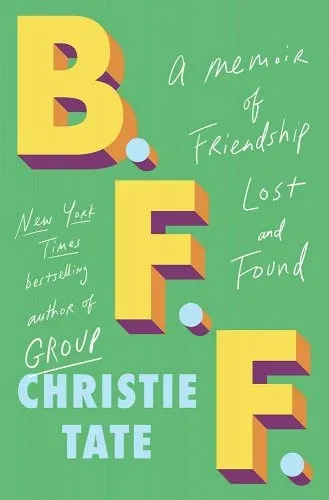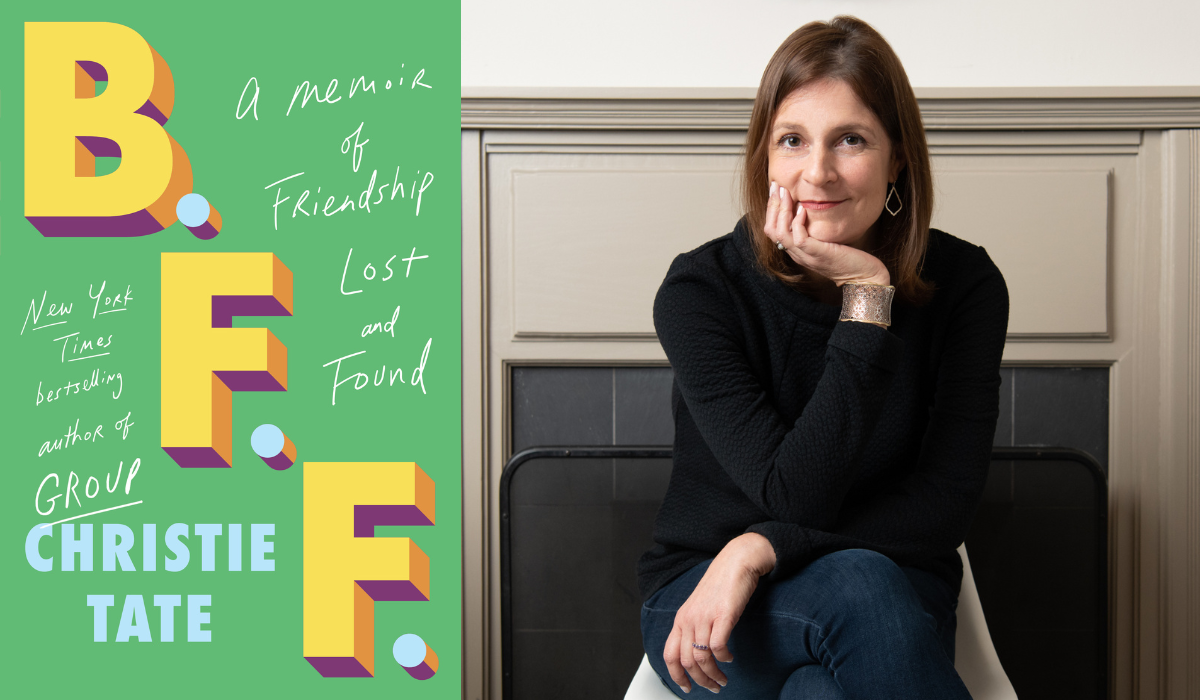Bestselling Author Christie Tate Shares How Her Dying Friend Taught Her to Be the True Friend She'd Always Wanted to Be
It was the size and shape of a pea, big enough to see below Meredith’s clavicle. She wore a blush-colored V-neck T-shirt and gray pants. The air outside was a chilly 66 degrees, but she wore flip-flops. She pointed at the pea and said she had to get it checked out. I felt no fear about the pea, because I had no idea that serious illness could be so obvious, so detectable with the naked eye, but also so harmless looking. I mean, it literally looked like she’d swallowed a pebble and right after it passed her epiglottis, it hooked left instead of proceeding down her esophagus to her stomach.
I knew she was a survivor of breast cancer.
I knew her mother and one of her sisters had survived several bouts each.
She didn’t seem afraid, and so I wasn’t either. She mentioned it halfway through our time together and shrugged it off. She loved her doctor and was looking forward to “catching up” with her. I pictured a seasoned physician with slightly scuffed black flats and a low ponytail,
someone slightly older than Meredith who looked like Jane Goodall and asked her what books she’d been reading. My fantasy conveniently omitted that the doctor was an oncologist, and I didn’t register that it was a little strange how giddy Meredith seemed about seeing her.
Out in the street, we hugged, as we always did, when we said goodbye. I didn’t say good luck at your appointment because I didn’t think she needed it. I texted her later that day, something vague, like Thinking of you with a flower emoji. Maybe some part of me was afraid, but not ready to put it into language.
Meredith’s text said she’d call in five minutes. It was a few days after an appointment at which they’d ended up scanning her whole body.
The phone buzzed, and Meredith’s name glowed on the screen. When I picked up, her voice sounded far away. She was not sixty-something Meredith; she was a frightened little girl when she spoke.
“It’s my liver.”
The pea was nowhere near her liver. How was this possible? My hands shook as I slid my computer out of my way and placed both elbows on the table to brace myself. The liver was the worst.
Except maybe the brain. The brain was definitely worse.
“And my brain.”
She breathed. I breathed.
“This is really bad,” she said.
“Okay. Yes.” Why lie?
“There are so many things I want to do.”
Lines of dialogue ran through my head, but each one seemed wrong in so many ways, not the least of which was that they didn’t fit me or my heart or our relationship. I pictured a TV mom telling her stricken son, “We’ll fight this!” Or a woman in a movie who tells her friend she knows people at Sloan Kettering. In real life, I knew a couple of shrinks, a cardiologist, and an ER doctor—no one who could save the day.
All of my genuine, unscripted questions sounded lame, upsetting, or intrusive. How much time do you have? What are the treatment options and when do they start? What stage is this thing? Will the chemo make you bitchy and even skinnier? Will you leave me?
Thank God I said none of them.
“I love you. I’m right here.”
When I hung up, I shut my computer and gathered up my things. I needed a moment alone in a bathroom stall. If I’d blown up friendships over alcoholic love interests, jealousy/envy, and an inability to set boundaries to get the space I needed, how was I going to do this with Meredith? I wasn’t entirely sure what “this” was, but I imagined I was about to adopt some new vocabulary words: chemo, wig, hospice, goodbye.
Three days later, we sat across from each other at our favorite spot on Michigan Avenue that was nothing special, just a chain café, but it had become ours over the hours we spent in the booth in the back.
Neither of us ordered, and no one seemed to care. The tables around us sat empty, almost like there was a force field surrounding us, keeping strangers at bay.
Meredith talked dispassionately about the treatment plan and the next series of appointments. But then she softened and seemed to return to her body and her feelings. She sighed deeply and tears appeared.
Finally.
“I hate hearing everyone’s pity,” she said, sipping the thermos of coffee she’d brought from home.
“Are you sure it’s pity? It might be sadness, grief, fear—” I had lots of feelings about Meredith’s news, but pity wasn’t the word I would use for any of them.
“It feels like pity.”
What the hell did I know? I didn’t want to push her—bully her into feeling what I thought she should—but I hated watching her turn other people’s well-intended if feeble gestures of love into something unpleasant. Could I help her see it another way?
“What’s the worst thing someone’s said?”
She rolled her eyes and sat up. “It’s hard to pick. My friend Julia insisted I get some crystals and go to this shrine in New Mexico. Sherri talked to me about my diet and forwarded me articles about all the foods that could shrink the tumors.”
“Did you read them?”
She grimaced. “I don’t have time for that.”
“People can be so terrible.”
“No one is talking to me in their real voice. Everyone sounds so hushed and sad. Makes me feel like I’m already dead. It’s very lonely.”
She asked me about my weekend with the kids. I didn’t know this was day one of a new pattern: we’d talk about her illness—updates, appointments, symptoms—and then she’d insist on dispatches from the world of the well. Details about the potluck at school, my coffee-making duties at work, my ongoing obsession with our mutual friend, Anna. I punched up my anecdotes, trying to get her to laugh, happy to serve as the butt of a joke.
In quiet moments, I thought about my past close friendships—Lia, Kate, Marnie, Callie, and Anna. The drifting I’d let happen. The ghosting. The projecting. The thought of failing Meredith made me feel sick to my stomach, but I knew I would. Of course I would. Look at my track record. I dreaded my future failure so much, it made me want to pull away now so I wouldn’t fuck it up later. I had to tell her.
“I’m going to fail you, you know. All the ‘Good Orderly Direction’ in the world won’t be powerful enough to stop me.”
She looked startled. “No, honey, you won’t—”
“I will. I know I will. We both know I’ll do something stupid. I’ll get scared and back away. Or you’ll want some space, and I’ll take it personally. Or I’ll be envious. Something bad is going to happen between us. I know it.” I’d tried so hard not to cry, but there was no stopping the tears.
“You’re going to do just fine.”
“Meredith, you know I have blind spots. What if I’m jealous of all the attention you get? Oh my God, I can see it now. Our friends will call me to talk about you, and I’ll be, like, ‘Yeah, Meredith, sure, she’s in ICU, but don’t you want to know whether I got bangs or won my oral argument?’
Or what about when you have less energy, and you choose to spend time with other friends and not me.” I grabbed her hand and held her gaze. “Think of the day I heard a health update from Anna. You’ll be fighting for your life and I’ll be outside your hospital room obsessing over why you reached out to her first.”
This worry was as real as the table between us, her giant black tote bag, my unmanicured cuticles. I looked into my future with Meredith and saw a series of obstacles, points in time when she would need me to step up or get out of my own way and friend her as she needed to be friended. She would need me to surmount my internal hurdles and show up as her faithful, stalwart friend. How could either of us have any confidence I could do that?
Meredith smiled and cocked her head.
“You can’t even deny it,” I said. “You know I’m going to fall on my face over here. The consequence will be that I let you down. This is a foregone conclusion. No one knows the holes in my friendship résumé more intimately than you.”
“Okay, so what if you fuck up?” She was laughing. She didn’t have time for friends who were only half-baked; she needed fully cooked companions who could serve her as her body broke down.
“It’ll be unforgivable. What if I do something bad, like, at the end, and there isn’t time to make amends or make it right.”
“So fuck up early and get it out of your system. Or I guess I’ll have to haunt you.”
“Maybe we should part ways now; it might save so much pain.”
She squeezed my hand hard enough that all of her stacked golden rings pressed against my fingers.
“You’re not going anywhere. I need you, and we’ll figure it out together.”
“I want to go on record: I’m scared of failing you, and it makes me want to leave so I don’t have to watch myself fail. And when I do, I’m going to probably say, ‘I told you so.’ ”
“There is no record, Christie. There is only this moment. You’re here now. Keep doing what you’re doing.”
A few days later I got a two-line email from Meredith. I believe in you. Thought you should know.

Excerpted from B.F.F.: A Memoir of Friendship Lost and Found by Christie Tate. Copyright © by Christie Tate. Reprinted with permission of the publisher, Avid Reader Press.
Christie Tate is the author of the New York Times bestseller Group, which was a Reese’s Book Club selection, as well as her new book, B.F.F.: A Memoir of Friendship Lost and Found (S&S/Avid Reader Press, 2.7.23). She has been published in The New York Times, The Washington Post, Chicago Tribune, McSweeney’s Internet Tendency, and elsewhere, and she lives in Chicago with her family.
Question from the Editor: How to show up for your friends? And what makes a good friend? We'd love for you to share your thoughts in the comments!
Please note that we may receive affiliate commissions from the sales of linked products.



